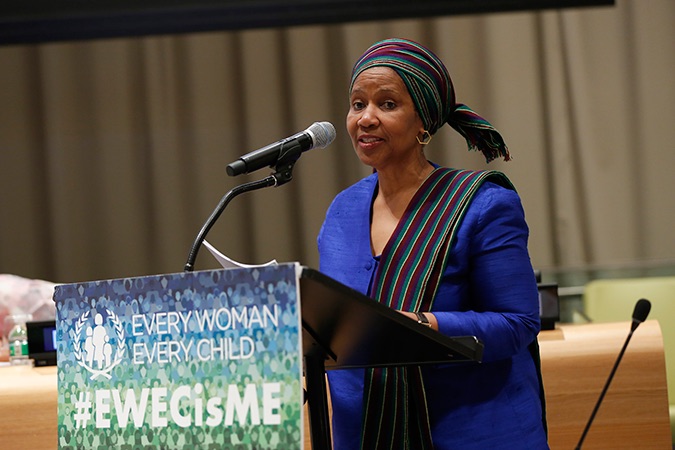“Women are crucial for a resilient health system,”—Executive Director
Speech by UN Under-Secretary-General and UN Women Executive Director Phumzile Mlambo-Ngcuka at the “Every Woman Every Child High-Level event: The Roadmap to Realizing Rights: Every Woman Every Child’s Global Strategy for Women’s, Children’s and Adolescents’ Health”, 15 March, 2016, New York.Date:

[As delivered]
As we take the Global Strategy on Women’s, Children’s, and Adolescents’ Health to the next level, I am pleased to speak on behalf of the H6 partners. Let me take a moment to acknowledge our Secretary-General. Because of his efforts, we have seen monumental progress since the launch of Every Woman, Every Child.
A woman’s health is a woman’s right. Without rights, women’s health and well-being hang in the balance. This means that we must also look to legislation. Internationally and in global normative frameworks, sexual and reproductive health and rights are an accepted fact. However, only 32 per cent of countries have and enforce laws that protect all dimensions of sexual and reproductive rights.
And yet, we know that where these rights are not guaranteed, health outcomes suffer. We also know that the degree of gender inequality in a country has a direct impact on the health of women and girls. For example, a 2013 study showed that in Angola, Botswana, Malawi, Mozambique, South Africa, Zambia and Zimbabwe, high levels of gender inequality are directly linked to high levels of maternal mortality.
As far as adolescent girls are concerned, we also have specific challenges and needs. Complications from pregnancies and deliveries are one of the leading causes of death for girls aged 15 to 19, who should not be having babies in any case. Harmful practices such as FGM and early or child marriage contribute to this high mortality rate. Every day, many more women die and are also affected by other critical diseases. Every day, more women and girls are also being infected by the Zika virus. The consequences of this for them and for society are not yet fully known.
Reaching girls with information before they become sexually active can influence them in their school attendance, in their participation in income-generating activities, and likelihood of using sexual and reproductive health services.
This 60th Commission on the Status of Women (CSW) has a unique feature: the launch of the Youth CSW, which presented its recommendations and conclusions on Monday. They told us: “In 2030, we want to see a world where success, health, and safety are available to all, irrespective of gender.”
They want to: “strengthen health systems that make universally accessible and available quality comprehensive sexual and reproductive healthcare services, commodities, information and education delivered by trained and sensitized healthcare providers.”
They also said they want to ensure that the promotion and protection of all human rights for all women means that they have access to services, are able to make decisions on their sexual needs, and are protected in relation to sexual rights as well as sexual orientation.
Excellencies, we also must expand our focus beyond individual behaviour to consider political, economic and cultural factors that limit individual autonomy, choice and action. When a woman experiences intimate partner violence and has limited access to sexual and reproductive health services and administration of justice, her individual options are severely limited. We know that women in abusive relationships are less likely to use contraception, are up to 50 per cent more likely to have unintended pregnancies, and are 2.7 times more likely to seek an abortion.
If we can resolve the abuse, we can make significant progress on the issues that are faced by women and girls in relation to their health.
Women are crucial for a resilient health system, both as recipients of the service and as those who make the service viable.
During the Ebola crisis, women played critical roles as contact tracers and community mobilizers to prevent spread of the disease, even though they were at risk of infection. In Liberia, UN Women and the H6 partnership supported training of community health care workers to reduce the disruption to maternal services during the epidemic and during the recovery phase.
With the Zika virus, women and adolescent girls are on the frontlines of information flow and advocacy for a gendered approach. They are an essential primary network for distribution of information about how to avoid the virus and what to do in case of infection.
There is also a vital role for men to play in responsible reproductive health, including by preventing pregnancies, supporting women’s choices and involving themselves in childcare. We also have to underline the fact we are greatly in need of men who can support our health systems to ensure they are robust as well as resilient.
Inadequate access to health care remains a key barrier for women and girls’ progress.
As we move towards localizing the SDGs and developing strategies for implementation, let us remember: where women and girls enjoy the full range of human rights, their health is most likely to flourish—so are communities and nations.
I wish you a productive discussion and session this afternoon in New York.
Thank you.
Read more
Harnessing the collective strengths of the UN system to reach every woman, child, and adolescent
Watch the archived webcast of the event